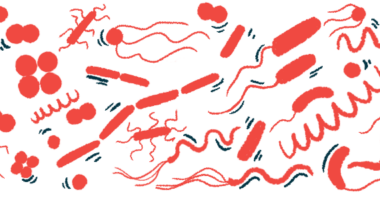GB0139 fails to slow lung function decline in IPF: Top-line trial data
Galecto will discontinue developing the treatment

GB0139, an investigational inhaled treatment for idiopathic pulmonary fibrosis (IPF), failed to slow lung decline in IPF patients compared with a placebo, according to top-line data from the Phase 2b GALACTIC-1 trial.
GB0139’s developer Galecto will discontinue the treatment.
“We are very disappointed that the GALACTIC-1 results do not support the continued development of GB0139 as a new treatment for IPF,” Hans Schambye, Galecto’s president and CEO, said in a company press release.
IPF is a progressive chronic disease marked by stiffening lung tissue, leading to permanent scarring, or fibrosis, and breathing difficulties. Most cases of pulmonary fibrosis are classified as idiopathic, or without a known cause.
GB0139 is an inhaled formulation of a small molecule that blocks the activity of galectin-3, a protein that’s in fibrotic lung tissue and associated with disease severity, progression, and symptom worsening.
GB0139’s ups and downs
In a Phase 2a study (NCT02257177), GB0139 was found to be well tolerated and able to lower galectin-3 alongside biomarkers linked to IPF severity and progression.
Building on these findings, the company launched GALACTIC-1 (NCT03832946) to evaluate GB0139’s safety and effectiveness in IPF patients. The participants were randomly assigned to receive inhaled GB0139 (10 mg or 3 mg), or a placebo inhaler, once daily for a year.
In March 2021, citing safety concerns, a regulatory board advised Galecto to pause enrollment and treatment in certain patients. Patients in the 10 mg group and those receiving 3 mg along with standard-of-care Esbriet (pirfenidone) or Ofev (nintedanib) left the study. Enrollment resumed after Galecto provided regulators with revised protocols.
After a year of treatment, the GALACTIC-1 trial didn’t meet its primary endpoint of a change in the rate of lung function decline, as measured by forced vital capacity (FVC), or the total volume of air forcibly exhaled from the lungs after a deep breath.
Over a year, mean FVC dropped 316.6 mL in patients treated with GB0139 and 127.4 mL in those given placebo — a 189.2 mL difference that favored the placebo. Galecto noted the decrease in lung function in the placebo group was lower than that seen in other placebo groups from previous IPF trials of other therapies.
Also, galectin-3 levels rose during the trial in both the GB0139 and placebo groups, underscoring the lack of confirmed “[therapeutic] target engagement in the trial.”
A safety analysis found a significant amount of IPF-like side effects with GB0139, matching changes in FVC. The most common ones included cough, shortness of breath, and COVID-19. More patients had serious side effects, including worsening IPF symptoms, with GB0139 than a placebo (7.8% vs. 1.4%). The frequency of fatal side effects was similar in both groups.
Galecto is planning to analyze the placebo arm with external experts and will report trial data at an upcoming medical conference.
“Galecto expresses its sincere thanks to the patients and clinical trial investigators for their participation in this study,” Schambye said.








